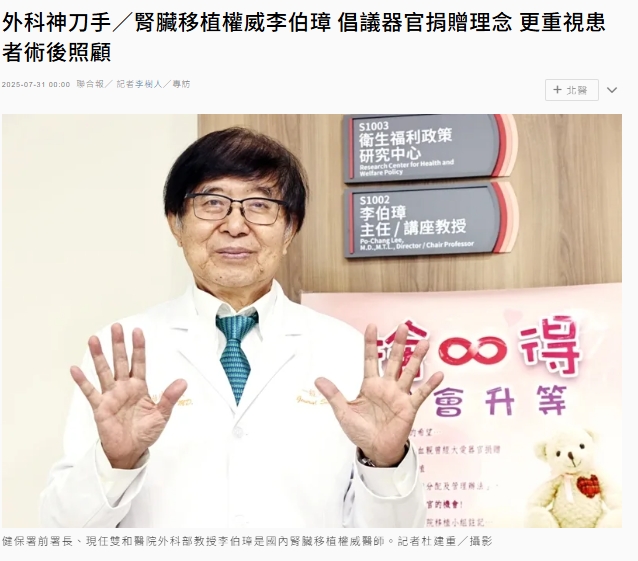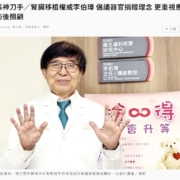【Media Interview】United Daily News: Surgeon/Kidney Transplant Authority Li Bozhang advocates that the concept of organ donation should pay more attention to postoperative care of patients

In Taiwan’s Organ Transplantation Field, Two “Dr. Lee Pos” Stand Out in the North and South
In Taiwan’s field of organ transplantation, there are two renowned figures known as “Dr. Lee Po.” In the north, the elder brother Dr. Lee Po-Huang specializes in liver transplantation and is known as “Big Dr. Lee Po.” In the south, Dr. Lee Po-Chang is dedicated to kidney transplantation and is referred to as “Little Dr. Lee Po.” The two brothers have created a legendary chapter in the history of surgical medicine.
During his 6 years and 8 months as Director-General of Taiwan’s National Health Insurance Administration, Dr. Lee Po-Chang made substantial contributions to healthcare reform. Earlier, during his tenure as Chairman of the Taiwan Organ Registry and Sharing Center, he actively promoted the concept of organ donation, challenging traditional beliefs such as “the body must remain whole after death.” His achievements in kidney transplant surgery and transplant immunology are also highly regarded.
“Choosing a medical specialty is closely related to personality,” says Dr. Lee Po-Chang.
While studying medicine at Taipei Medical University, Dr. Lee was passionate about sports. He was on the university tennis team and also played baseball and badminton. During summer and winter breaks, he participated in mountain service corps, traveling across hills and coasts. His energetic and active personality made surgery a natural choice for him.
His First Operation as a Medical Intern
During his internship, Dr. Lee performed his first surgery—an appendectomy—under the guidance of a senior resident. The surgery went exceptionally smoothly. As soon as he cut into the abdomen, the swollen appendix popped out clearly into view. Following the proper steps of tying and suturing, the operation was completed in under 20 minutes. The deep sense of accomplishment from saving a life through surgery sparked his enduring love for the profession.
As a resident at Taoyuan General Hospital, Dr. Lee studied organ transplantation under then-superintendent Professor Lee Chun-Jen. Assisting in surgeries and caring for patients post-op gave him a strong sense of the great responsibilities surgeons bear—even beyond the operating room. He realized that post-operative care is just as complex and vital as the surgery itself.

Guided by His Older Brother: His First Gastrectomy
As a leading kidney transplant expert in Taiwan, Dr. Lee is deeply grateful to his older brother, Professor Lee Po-Huang, a surgery professor at National Taiwan University. At several key moments in life, his brother stood by him, offering support and strength to help him stay calm and make crucial surgical decisions.
Back when gastric bleeding and perforation were common in Taiwan, Dr. Lee performed his first gastrectomy under his brother’s guidance. Operating in a continuously bleeding abdominal cavity, he had to suture delicate gastrointestinal tissue with precision and speed—a demanding task that required both skill and timing.
His Academic Journey into Organ Transplantation
Dr. Lee recalled that after being promoted from chief resident to attending physician at Taoyuan Hospital, he was fortunate to receive a provincial government scholarship to study in the U.S. He became a surgical research fellow at UCLA, mentored by the then-President of The Transplantation Society and a globally recognized immunology expert. That experience launched his academic career in organ transplantation.
Researching Serum Matching While Studying in the U.S.
During his time in the U.S., one of Dr. Lee’s key research tasks was assisting in the analysis of patient data. He studied serum samples from numerous organ transplant recipients and discovered that the closer the genetic match between donor and recipient, the lower the risk of graft rejection.
Following transplantation, the recipient’s body naturally produces antibodies. By analyzing pre-transplant serum reports, doctors could predict the likelihood of rejection with greater accuracy.
International Recognition for Research
After returning to Taiwan, Dr. Lee continued related research. In 1998, he co-authored a study on kidney transplantation with Professors Li Huan-Yao and Su Yi-Jen, which was published in The Lancet and awarded the Best Paper of the Year by National Cheng Kung University’s College of Medicine. In 2002, he presented at the American Transplant Congress (ATC) in front of hundreds of international experts—becoming the first Taiwanese physician to do so and receiving high acclaim.
Sleeping in the ICU—Relieved by a Patient’s First Urination
Why did Dr. Lee commit to kidney transplantation? Between 1979 and 1989, he assisted Professor Lee Chun-Jen with 179 kidney transplants. In 1989, he transferred to National Cheng Kung University Hospital (NCKUH), where he performed both his own and the hospital’s first kidney transplant surgery. The success of that surgery was crucial.
On the night of the operation, Dr. Lee slept in the ICU, personally caring for the patient. He only felt relieved after seeing the patient successfully urinate—a key indicator that the transplanted kidney was functioning properly.
“After kidney transplant surgery, we’re always waiting for that first urination,” Dr. Lee said with a smile.
“Even if the urine sprays on your face, you’d still be happy!”
During his time at NCKUH, Dr. Lee led the hospital’s medical team to complete 676 kidney transplants. The 10-year survival rate of these patients was comparable to those in Western countries. He also compiled his surgical experiences into a textbook on surgery, which he made available online as a free digital download.
●Dr. Lee Po-Chang – Profile
-
Age: 71
-
Current Positions:
-
Chair Professor, School of Public Health, Taipei Medical University
-
Director, Center for Health and Welfare Policy, Taipei Medical University
-
Professor of Surgery, College of Medicine, National Cheng Kung University
-
-
Contributions:
-
Assisted in 179 kidney transplants at Taoyuan General Hospital (1979–1989)
-
Completed 676 kidney transplants at NCKU Hospital (1989–2025)
-
Has tracked and cared for 1,143 kidney transplant patients
-
- Hand size: 20 x 20 cm (average East Asian adult male: 18 x 18 cm)

Original source:https://udn.com/news/story/7266/8907638



